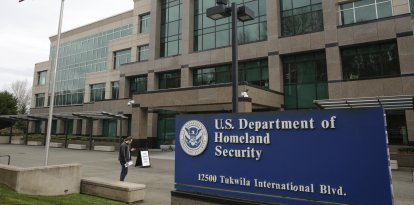Key votes: ten states decide future of abortion restrictions
The election centers on whether to enshrine abortion rights in state constitutions at a time when the debate over protecting life is at the center of national politics.

According to Judge Robert CI McBurney, the 2019 law violated Georgia's constitution/ Suzanne Cordeiro
This Tuesday, voters in ten states in the United States will not only determine who will occupy the White House, but also decide on the future of abortion in their states. The elections center on whether to enshrine abortion rights in state constitutions at a time when the debate over protecting life and respecting the rights of the unborn is at the center of national politics.
Since the U.S. Supreme Court overturned Roe v. Wade in 2022, striking down the federal right to abortion, several states have sought to redefine their laws on the issue. In some of those states, such as Arizona and Florida, voters could reverse abortion bans, seeking to extend the time frames in which abortions are allowed.
In other states such as Colorado and New York, proposals seek to strengthen abortion protections, which could make it more difficult to reverse abortion access in the future, even if conservative lawmakers were to take power. Here's a look at the states where abortion is on the ballot this year:
Arizona
Proposition 139 in Arizona seeks to create a "fundamental right" to abortion, which would prevent the state from intervening before so-called fetal viability, usually between 22 and 24 weeks. This measure, which requires only a simple majority to pass, would expand abortion access to a higher limit than the current 15-week limit, allowing for later terminations in pregnancy.
Colorado
Amendment 79 aims to include abortion as a right in the Colorado Constitution, while eliminating the amendment that prohibits the use of state funds for these procedures. This would open the door to public funding of abortion and make it virtually impossible for local governments to regulate access to this practice. The proposal requires 55% support to pass and would strengthen Colorado's already extensive abortion laws.
South Dakota
Constitutional Amendment G attempts to overturn South Dakota's near-total ban on abortion, replacing it with a regulation that divides pregnancy into trimesters. This would allow unrestricted abortion in the first trimester, limiting the state's role only in the second and third trimesters. Exceptions would be included allowing state intervention only in cases of the health or life of the mother.
Florida
Amendment 4, entitled "Amendment to Limit Government Interference in Abortion," is designed to repeal Florida's current six-week ban, expanding abortion to the point of fetal viability. The proposal, which needs a 60% vote, has garnered national attention and drawn comments from former President Donald Trump, who expressed reservations about the current restriction, although he ultimately disagreed with the measure.
Maryland
Question 1 in Maryland proposes to guarantee access to abortion by including it in the state constitution. This would make it even more difficult to limit access to abortion, in a state that already has permissive laws on the subject. The measure requires only a simple majority to pass at the ballot box.
Missouri
Amendment 3 proposes to amend the Missouri constitution to reverse the state's existing ban on abortion by limiting any state intervention until fetal viability, and protects those who seek or facilitate the practice of abortion. This measure requires only a simple majority to pass and proposes to reduce current restrictions.
Montana
Voting Proposition 14 in Montana would allow voters to decide whether to enshrine abortion as a right in the state constitution, which would limit the state's ability to intervene before fetal viability. This proposal comes two years after voters rejected the Born Alive Infants Protection Act, which sought to grant legal rights to live-born babies, even in cases of abortion.
Nebraska
Nebraska features two competing initiatives. Initiative 434 seeks to restrict abortion in the second and third trimesters, allowing it only in cases of medical emergency, sexual assault or incest, while Initiative 439 seeks to establish abortion up to fetal viability as a right. Currently, Nebraska allows abortions up to 12 weeks gestation. If both initiatives were to pass, whichever receives the greater support would prevail.
Nevada
Proposition 6 in Nevada proposes to establish abortion as an individual right in the state constitution. This measure, which would need to pass in two consecutive elections (2024 and 2026), would allow the state to regulate abortion only after fetal viability, with exceptions to protect the life or health of the mother.
New York
Proposition 1 in New York introduces the term "reproductive autonomy" into the constitution, including pregnancy and its outcomes as protected categories, although without explicitly mentioning abortion. The measure also seeks to add more categories of protection from discrimination and would allow abortion up to 24 weeks.
The repercussions of these elections
The impact of these votes will be significant for the future of abortion rights in the United States. At a time when the debate over the value of human life and the rights of the unborn remains central to American politics, these decisions reflect an ongoing battle between those who defend the right to life and those who seek to expand access to abortion.

























